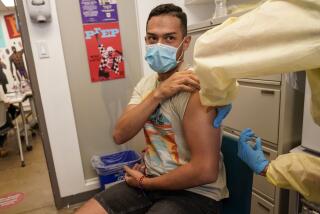Report Cites Safety of Military Vaccination Program
- Share via
WASHINGTON — The large-scale smallpox vaccinations of U.S. military personnel were conducted so safely that President Bush’s civilian vaccination effort should be able to proceed at a much faster rate than it has so far, a study published Tuesday found.
But representatives of some of the front-line health-care workers who are eligible for the government’s voluntary vaccination program remained skeptical about participating.
Charles Idelson, spokesman for the 50,000-member California Nurses Assn., said there was no sign of a bioterrorist attack with the smallpox virus, from which the vaccination program is designed to protect the nation.
He said the vaccination program represented a “massive diversion of public resources for badly needed health care toward a program that has, to this date, been demonstrated to be totally unnecessary. Any of the adverse reactions that have occurred as a result of this immunization program have been too many.”
The study of the nearly 500,000, mostly young military personnel who were ordered to be vaccinated from December to May found that only a handful experienced serious adverse side effects. None died, according to the study, which was published in the Journal of the American Medical Assn.
The study found 37 cases of mild to severe myopericarditis (an inflammation of the heart or its membrane) among the 450,293 vaccinated. It said all 37 individuals were expected to return to duty.
There were many instances of rashes in the area where the vaccination was administered, and one case of encephalitis, an inflammation of the brain.
Bush launched a program in February aimed at inoculating 450,000 civilian health-care workers and another 10 million emergency personnel as a precaution against the possibility of a bioterrorist attack.
As of June 13, 37,608 civilian health-care workers had been inoculated, according to the Centers for Disease Control and Prevention.
Only a fraction of the eligible workers have volunteered to be vaccinated, and the comments of their representatives Tuesday suggested that the study of the military’s experience would not have much effect.
Several hospitals and public health departments are proceeding carefully with the vaccinations, still wary of the rashes, encephalitis and heart problems linked with the disease.
“We’ve moved ahead slowly and safely and cautiously,” said Tim Church, a communications representative with the Washington state Health Department. The department’s secretary is Mary Selecky, the president of the Assn. of State and Territorial Health Officials.
Washington state has so far vaccinated 543 employees. “We certainly have felt that it would increase our level of preparedness,” Church said. “We support the federal efforts.”
Congress enacted legislation in April to guarantee compensation to civilians injured by the smallpox vaccine. Even that had little effect on the campaign.
The Los Angeles County Department of Health Services had aimed at vaccinating 10,000 employees; the current count is 238, according to Dr. Laurene Mascola, chief of the department’s acute communicable disease control unit.
Mascola said that although the smallpox vaccine “isn’t the best vaccine in the world, we still need people vaccinated in the event of [a terrorist] event.” She said the department had targeted its vaccination efforts on potential responders to a public health emergency.
“We are in agreement with the nation,” she said. “But this study doesn’t change feelings or our plans.”
The military study was written by John Grabenstein of the Army Medical Command’s Military Vaccine Agency and Dr. William Winkenwerder Jr., the assistant Defense secretary for health.
More to Read
Sign up for Essential California
The most important California stories and recommendations in your inbox every morning.
You may occasionally receive promotional content from the Los Angeles Times.













